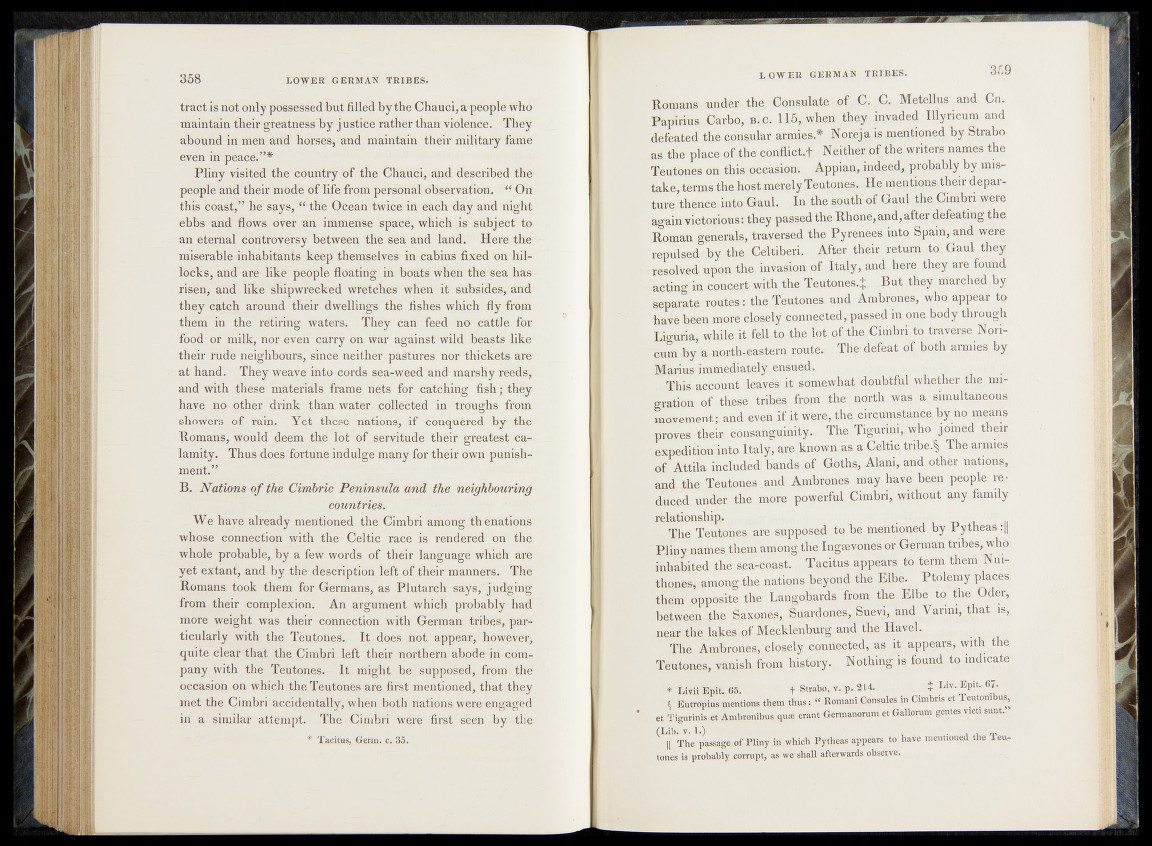
tract is not only possessed b u t filled by the Chauci, à people Who
maintain their greatness by justice rather than violence. They
abound in men and horses, and maintain their military fame
even in peace.”*
Pliny visited the country of the Chauci, and described the
people and their mode of life from personal observation. “ On
this coast,” he says, “ the Ocean twice in each day and night
ebbs and flows over an immense space, which is subject to
an eternal controversy between the sea and land. Here the"
miserable inhabitants keep themselves in cabins fixed on hillocks,
and are like people floating, in boats when the sea has
risen, and like shipwrecked wretches when it subsides, and
they catch around their dwellings the fishes which fly from
them in the retiring waters. They can feed no cattle for
food or milk, nor even carry on war against wild beasts like
their rude neighbours, since neither pastures nor thickètà'-ure
a t hand. They weave into cords sea-weed and marshy reëd&j
and with these materials frame nets for catching, fish ; they
have no other drink than water collected in troughs.','•from
showers of rain. Yet these nations, if conquèred by the
Homans, would deem the lot of servitude their greatest calamity.
Thus does fortune indulge many for their own punishment.”
B. Nations o f the Cimbric Peninsula and the neighbouring
— countries.
We have already mentioned the Cimbri amongjh enations
whose connection with the Celtic race is rendered on the
whole probable, by a few words of their language which , are
yet extant, and by the description left of their manners. The
Romans took them for Germans, as Plutarch says, judging
from their complexion. An argument which probably had
more weight was their connection with German tribes, particularly
with the Teutones. It does not appear, howevelr,
quite clear that the Cimbri left their northern abode in company
with the Teutones. It might be supposed, from the
occasion on which the Teutones are first mentioned, that they
met the Cimbri accidentally, when both nations were engaged
in a similar attempt. The Cimbri were first seen by the
■ * Tacites, Germ. c. 85.
Romans under the Consulate,.of ,C. C. Metellus and Cn.
PapiriusvCarbo, b.c. ,115^ when they, invaded Illyricum and
"defeated the consular armies.* Noreja is mentioned by Strabo
as the piace|o£-(itheleomaict,t Neither of the writers names the
Teutones on this.occajsiqir.- 4 (PPian> Weed,, probably by mistake,
terms theho^rnprelyTedfo^s. He mentions their departure
thence into Gaul. .In,,the south of Gaul the Cimbn were
again victorious: they passeAth&Rhone, and,after defeating the
Roman generals,,traversed the Pyrenees, into, Spain, and were
repulsedi-by th e^ eltib eri. ( After t h g j ^ t u m to Gaul they
^ s o lv e d B thfiy are foand
a c tin g ^ concert with the. T e ^ n e ^ But .they^mashed by
H H H H K the Tei^one^and Aml^ones, rwho appear to
have been more £ l j ^ d y ^
Liguria, 3 1 B O B B I
cum by a , ' Thp, ^ a t #©| both armies by
. MariiTS i m
. T h islfg co u n ^ ^ ^ ^& t s^^e^ha^? do^uht^l,, ||h e t|n r the migration
of B S B B B ]
movement; H H B [t meanS
peves their consanguinity. B B B w h o , W ^ t h e i r
I expedition into It;aly,-are knowmas § j g | I B g | T h e a rm ie |
of Attila included b a n |^ o f Goths, Alani, and | | ^ ;n a t i ^ ; >
and the Teutpn^' |n d Ambrones may 8 S E B g B g | re '
(Seed under the .more po^e^ful Cimbrij wffhout any family -
relationship. . -
The^Teutpnes.,are; sp p p p s^ .h $ ,^m e n tim e d .b jf *
' Pliny names th em am ^ n g .th e li^ ^ ^
inhabiteAth^sej-c^ash ^ Tacitps f e r m ^ ^ 'Nuithones,'
am,oqg the
kdhem opposite the Langobayds from the- E l|p |Jo the Oder^
b jty e en ,th e B 9 H R | c § n | f ^ y^hnd^yarjni, that ,is;
near th,e lakescpf;Mecklenburg and the Havel.
The A m llp ^ ^ v c lo ^ e ly -c o r^ c te d ^ 5 tbe
Teutones, vanish from )^i|tpry., Nothing is found t o ^ i c a t e
M B + Strabo, v. p. 214.
i Eutropius;mentions them (thus,:. “ Romani Consoles in Cimbris^Teutomb^
et Tigwriiitis e^Am^ohibus^uas erant;Germanprum et Gallorum gentes vioU sunt.,
B R The passage of Pliny in Vhich Pythfeas appears to have mentioned *he Teutones
is probably^corrupt, as we shall afterwards